Bill Gates: ‘Climate change is harder to solve than the pandemic but the negative effects are much greater’
When the Microsoft founder makes a prediction, he is usually right. The philanthropist believes we are running out of time, and must reduce greenhouse emissions to zero in 30 years or suffer the consequences. Although he is stunned by the lies and conspiracy theories that have flourished during the coronavirus crisis and worried about social polarization, he still believes we can save the future
Bill Gates
“The negative effects of climate change are much greater than those of the pandemic”
Watch interview (5:18 min) Ir al contenido Photo: ©John Keatley
Photo: ©John Keatley
Bill Gates argues that the effects of climate change will be much worse than the coronavirus pandemic if we don’t reduce greenhouse gas emissions to zero by 2050. He knows that it’s a mammoth task, but he does not think it is an impossible one – not if the business, tech and political sectors work together to reach the goal. He has a plan, which he explains in detail in his new book How to Avoid a Climate Disaster. The book rules out prioritizing efforts to mitigate the impact of global warming, arguing that it is already too late for that course of action.
Having recently received the first dose of the Covid-19 vaccine, the philanthropist and Microsoft founder talked to EL PAÍS about the current pandemic and the ones to come, the rise of anti-vaxxer movements and pandemic deniers on social media, and his hopes for the new administration of US President Joe Biden. This interview, like so many things at the current time, was done virtually.
A year ago the coronavirus in Wuhan began to quickly spread across the world. The cost on human lives and the economy has been immense, but we already have vaccines to fight it. Where do you predict we will be a year from now?
The dramatic effects of the pandemic will largely be behind us. There may be some areas in the world where we still have the disease circulating. The question now is if we can drive the number [of contagions] to zero or if it will become an endemic disease, meaning we have to continue vaccine coverage at fairly high levels on an ongoing basis. We don’t know. The ideal would be to eliminate the virus so that it does not spread from human to human. Overwhelmingly, businesses will be open, people will be going to public events. It does mean that the vaccination levels have to get above 70%. But, yes, by the summer of 2021, things will be largely back to normal. And by 2022, certainly in countries like Spain and in the United States, they’ll almost be entirely back to normal, with big public events possible.
How worried are you about the new variants and strains of the coronavirus and to what degree could they change your prediction?
It’s possible that we may need to come out with a modified vaccine that has even higher coverage. The biggest effect of the variants is that they significantly reduce the effectiveness of monoclonal antibodies, which I had hoped would cut the death rate even in parallel to the vaccination campaigns. Sadly, that therapeutic tool won’t be as valuable as I’d hoped for with the vaccines. However, these vaccines, certainly the ones from Pfizer and Moderna, are so powerful that their effects will still be very, very strong. We’re not even sure that we need to modify the vaccines, but we’re looking at that. It would probably take three months or so to do the quick safety studies and get the manufacturing going.
Have you been vaccinated?
Yes, I got my first dose. I happened to get the Moderna vaccine a few days ago in California, where they are vaccinating people aged 65 and up.
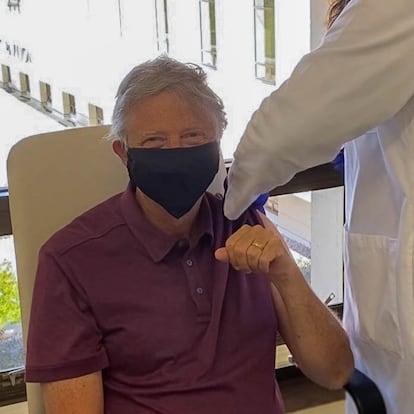
The Bill & Melinda Gates Foundation has invested $1.75 billion (€1.74 billion) in research and medical supplies against the coronavirus. What is your priority now: more investment, research or better distribution?
The vaccines from Pfizer and Moderna are based on the messenger RNA [mRNA], which contains a lipid nanoparticle that is still expensive to make. It’s hard to scale and it is not thermal stable. With more research and development [R&D] over the next five years, we can solve all the limits of mRNA. The vaccines from AstraZeneca, Johnson & Johnson and Novavax are more classical. The foundation has formed partnerships with the vaccine creators and Indian companies to make all three in that country. Most people are not aware that Indian vaccine factories are about five times larger than the ones in the west, because that’s where almost all the vaccines for developing countries come from. We’re trying to harness that to make the delay between the rich world getting vaccinated, and the developing world getting vaccinated, as short as possible. Right now it’s quite a difference. The amount of vaccines that are in the rich countries is very high, even when compared to middle-income countries like Brazil or South Africa, which have had a very tough epidemic, but are still getting the vaccine a bit more slowly.
The coronavirus pandemic has shown us that no one is safe until everyone is, or at least until 70% of the population is vaccinated. This implies unprecedented international collaboration. Could the pandemic have taught us more about how to act globally when it comes to facing other global challenges such as climate change?
Well it has certainly taught us about the need for global cooperation. This global effort on sharing information has been critical, because it’s the world versus the virus and no country alone can wall itself off. Not everything has gone perfectly – we have learned many lessons and will be better prepared for the next pandemic. If we had handled it right, we would have had less than 10% of the deaths and the economic damage that we’ve seen. The warnings were not heeded. My voice through my 2015 TED talk was one of those. I think it reinforces that citizens expect governments to bring in deep experts and listen to those experts about things that the government needs to be ready for.
The person who’s done the least to cause climate change is the person who will suffer the most from the problem
Climate change is much harder to solve, but the negative effects – if we don’t solve it – are also much, much greater. I’ve been impressed that the interest in climate has not gone down, as it did in many countries during the [2008] financial crisis, because it was considered a long-term problem. We have even seen that the European recovery funds are dedicating 35% to climate change. And my climate groups are talking a lot with the European Union and with Spain about solutions like what we can do with green hydrogen. You take some of that [EU] money and start bringing down the cost of green hydrogen, which sells at a huge premium to normal hydrogen, by scaling up new approaches. In the US, thanks to the election of Biden, it is a much more hopeful period for climate, despite the fact that we’re going to still be digging our way out of the damage of the pandemic for several years to come.
In your book, you confess to feeling a certain degree of guilt: you are a wealthy man, with many properties, who flies in a private airplane, with an enormous carbon footprint, although you argue it can be reduced. Is climate change a problem exclusive to rich countries, given that they are the ones that have caused it?
Carbon emissions are going up and a lot of the future emissions are providing very basic services in developing countries – air conditioning, shelter, light at night... Often people talk about reducing consumption, but sadly, that’s not a path to zero emissions. It can be helpful, but the only way you get to zero is to have the ability to drive your car with zero emissions, not just reducing how much you drive. In poor countries, meat and aviation and steel and cement continue to have very important purposes, and changing that without a huge price increase is very hard. I think we need to innovate green premiums to be very small so the poorest countries can afford to pay them. We may not even need to subsidize the remaining green premium. Let’s say we can innovate the green premium down by 95%, then middle-income and rich countries will pay the remaining 5%. The very poorest countries, many of which are in Africa, could be supported through some form of foreign aid subsidization. The foreign aid to Africa is not as high as it should be: the continent is facing population growth, climate change and there’s a lot of instability, something that climate change is going to make worse. The poorest countries shouldn’t bear this burden, and amazingly, they’re the ones that climate change affects the most. The person who is in the worst situation is a farmer who’s somewhere near the equator, where big heat spells mean that crops will fail very often and there will be lots of floods and droughts. In a way, it’s ironic because the person who’s done the least to cause the problem is the person who will suffer most from the problem.
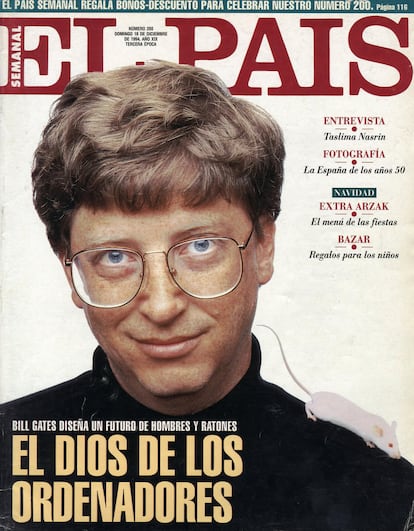
In Spain, backing solar and wind power is working, with costs becoming competitive. You are a big supporter of green energy, but also of nuclear power. In 2006, you created TerraPower to develop a fourth-generation nuclear reactor, but you recognize that the public has concerns about building new plants. Do you believe nuclear energy has a role to play in the future of electricity generation?
One thing people don’t recognize is that because we’ll be using electricity for many more things like heating buildings, passenger cars and many industrial processes, we will have to generate two-and-a-half times as much electricity as we do today. You’re absolutely right that the price of wind and solar have come down, even the price of offshore wind is now starting to come down. And that’s a miracle and it’s fantastic. There’s still a big problem though, which is that those sources of energy are intermittent. That is, you can get weather conditions where there is a cold front for many weeks, meaning that over a large area, neither solar nor wind generation work. In order to maintain reliability, we have to have unbelievable grid storage capability, which is 20 times harder than making a battery for a car. Another approach is to have a significant amount of energy that is always available, which is what nuclear fission or fusion could provide. In no way am I saying we should depend on that. If fourth-generation reactors, from TerraPower and perhaps others, prove to be cheap enough over the next five or six years and the safety is clear, people should have an open mind for that next generation of nuclear. Today’s nuclear power actually has a surprisingly good safety record: the number of deaths or injuries for the power generated is much less than in coal mining and natural gas pipelines. But I understand that for today’s generation of nuclear, we won’t be able to create public acceptance, so I give up on that.
In the future, we will have to generate two-and-a-half times as much electricity as we do today
Have you really given up on that?
Well, that’s today’s generation. TerraPower is about a form of reactor that has no pressure on the reactor and it has no afterheat. It’s very different. It doesn’t require human operators. If we get that storage miracle, then we won’t need fission or fusion, but there’s no reason to expect that we necessarily will achieve it, although there’s a ton of very ambitious companies investing in storage technology. The US government has funded TerraPower to build a demo plant over the next five years. Only if that goes well and gets approved by the Nuclear Regulatory Commission, the US Safety Commission – which is the best in the world – will we be going to various countries and proposing that it be used. I admit, even if it’s super safe, convincing the public will be one of the challenges.
Hours after becoming president, Biden signed an executive order to return the US to the Paris climate agreement. What other measures are you expecting from the new government as a sign of their commitment to addressing the problem of climate change?
First, we need at least an additional $20 billion [€16.6 billion] a year for climate-related R&D, and that’s just in the United States. We also need a lot of policies that encourage the use of green products, even at the early stage where they bear a very high premium, so we can bootstrap industries like cement and steel. The US has used tax credits to help the expansion of solar and wind, and now that those prices have come down, we can drop those credits and ship them over into earlier-stage technologies like storage or green aviation fuel. The total tax credits probably do need to be increased by a factor of two or three. And we need a lot of policies to help accelerate these deployments because 30 years is actually a pretty short time to change all your power generation and your steel and cement. I hope we can adopt these policies in a way so that it is clear that they’ll stay intact over this 30-year period, instead of being eliminated whenever the political winds change. Striking a path that’s even somewhat bipartisan for key parts like R&D will be critical.
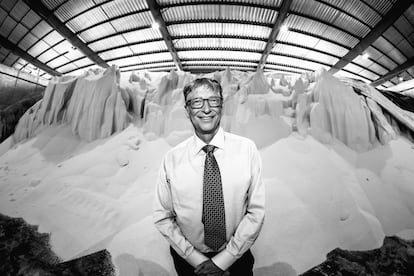
Are you worried about the lack of women studying science, engineering and computer degrees? These are professions that are fundamental to the green transformation you are advocating for.
Our foundation and, in particular, my wife is very committed to all those gender issues. Women in poor countries, in terms of giving birth and taking care of the kids, they bear much more than men. There’s a saying that poverty is sexist. It doesn’t mean when you get rich, you get rid of the problem, but it’s even worse in poor countries. We have a lack of talent in general. Even in the best universities, for example MIT, the amount of IQ going into industrial areas is way too low. Many more people are college-educated today than in the past. We need more talent working in these areas, and we need to make it attractive for the smartest people to go into these areas instead of, say, just financial work on Wall Street.
In addition to the rising numbers of climate change deniers, there have also been multiple conspiracy theories about the coronavirus and Covid vaccines which target you directly, claiming you are the mastermind behind a plan to control the world...
The pandemic has created a level of discussion of conspiracy theories that I never would have expected. [Director of the US National Institute of Allergy and Infectious Diseases] Dr Fauci and I are the main focus of those theories that suggest that, instead of trying to save lives, we’re trying to do the opposite; or that instead of trying to give money away, we’re trying to make money. It’s a serious problem if it makes people think that wearing a mask or taking a vaccine is not important. It’s been such a difficult situation that the fact that people seek overly simplistic explanations, like ‘it’s all from this bad person,’ is not totally surprising. But I didn’t anticipate how digital channels could make it so common – millions and millions of messages are sent every week about these things. I hope that this dies down. With respect to climate change, it is somewhat of a partisan issue, although I’m reaching out to Republicans who want to get involved, particularly young Republicans. Climate change in some ways is even more complicated than a pandemic. The amount of resources that we’re asking to be prioritized for the cause is much greater than what it took to make the vaccine. And yet, the damage it will cause is way, way greater both economically and even in terms of deaths. How can we avoid that? Ideally, the curriculum in schools will start teaching people about climate change. On the other hand, people are seeing these extreme weather events and that seems to help. They’re tragic events, but I think that is part of why the interest in climate change is much higher today than it was five years ago.
You say that you would like to have a magic invention that could steer the conversation toward a more constructive and less polarized place. The current tech giants have a lot of responsibility in this issue. I would like to know your opinion about how to regulate the global conversation, which is plagued by fake news. Who should regulate it and how? Can we trust in self-regulation?
Some countries restrict what you can print. The US is the most liberal thanks to the First Amendment of the Constitution, which says you can say and print pretty much whatever you want, even crazy stuff like Holocaust denial. The idea in this digital form is that it takes advantage of some human weakness. You get fed things that outrage you, and so you just click on more and more outrageous stuff and believe a lot of false news. But what is the role of social media companies in essentially blocking certain types of speech? That’s a very complicated problem, particularly when it comes to talking about, ‘hey, this is a good politician,’ ‘this is a bad politician.’ If you start to restrict that discussion, who is judging that? I have been glad that in the pandemic, social networks have blocked totally false anti-vaccine news, while trying to preserve the legitimate discussion about side effects, how the trials have been done and how confident should people be. There’s legitimate discussion there, but then there are lies as well. They’re getting practice with the anti-vaccine stuff on how they draw that line between the open communication that democracies benefit from and the fact that some people can’t resist just clicking on crazier and crazier things.
Where were you on January 6? Were you following the siege of the US Capitol?
Yes. When I was young, in 1972, I worked as a messenger boy so I know that building extremely well. I hadn’t watched the entire [Donald] Trump rally. But I stayed glued to the TV set for the next 15 hours, all the way up until the Biden electoral votes were completely certified very late in the night. Then, in the days since, I have watched the videos that have been gathered up, which give a clearer view of where people invaded and how bad things were. That was pretty horrific. It riveted me because we’ve never seen anything like that before.
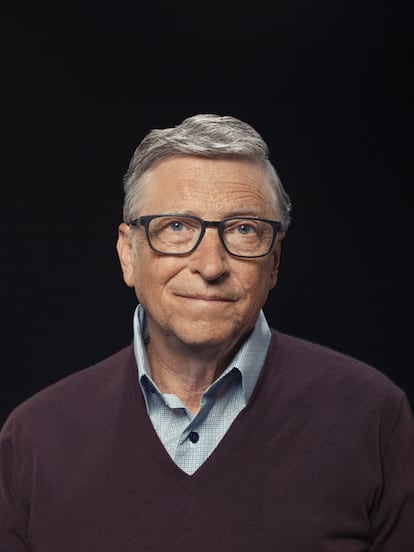
Do you think it’s over?
[Pause] Largely, yes. The US is not experiencing a lot of insurrections. After January 6, the country went to the extreme in various state capitals and in Washington, D.C., to avoid being accused of not being prepared enough. We called up the National Guard, but there was actually very little more that happened. In a way, you can say, ‘hey, our democracy is in good shape,’ but we also didn’t expect to even have any violence at all. It’s definitely a glass-half-full situation. Was Trump unique in our history or the predictor of more to come?
This pandemic has forced us to face our fears: of death, illness – ours or a loved one’s – to live with uncertainty about our jobs and future. How have you been personally affected?
The pandemic takes almost every inequity and makes it worse. Ethnic minorities suffer way more economically and also in terms of sickness and death. Even in Africa, where the coronavirus has not been so bad – except for South Africa – the effects on debt, tax and government trust may not be back to where they were before the pandemic for at least another five years. I feel guilty that my life was far less negatively impacted: although I didn’t do business travel, I have a good internet connection and I do office work. My kids go to a school that did great online learning. And so their educational deficit is quite modest. I even got to see my college-aged kids more than I would have. That was actually kind of beneficial. The idea of, “Do I, or people in general, need to travel as much or go into the workplace?” I’m fascinated by that question. We’ve been forced to change. Microsoft is trying to make [business communication platform] Teams even better, there’s a lot of software innovation to be done. It’s making us question: where and how do you still form personal connections? What do you miss? What should the balance be? I got to see the foundation take its infectious disease expertise, which most rich countries don’t focus on. As I say in our annual letter, it was the first time that global health really was global. Usually, global health is a synonym for developing-world health because that’s where the infectious disease burden is. I feel sad that the warnings about the pandemic were not heeded enough, but I feel that now the world will do the right thing in the next pandemic. It was a very, very unique year. Not without some benefits, like the mRNA technology, which we’ll use for lots of infectious diseases. Overall, it’s been very sad, but we have to take advantage of the innovations that it helped highlight.
‘How to Avoid a Climate Disaster’
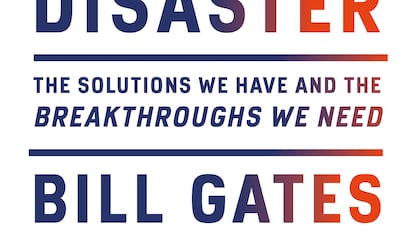
Bill Gates’ new book, which has the subtitle “The Solutions We Have and the Breakthroughs We Need,” presents the conclusions from a decade of research on climate change. The book not only aims to raise awareness, but also proposes a practical action plan to reduce greenhouse emissions to zero. It went on sale on February 16, 2021 in 20 countries.
